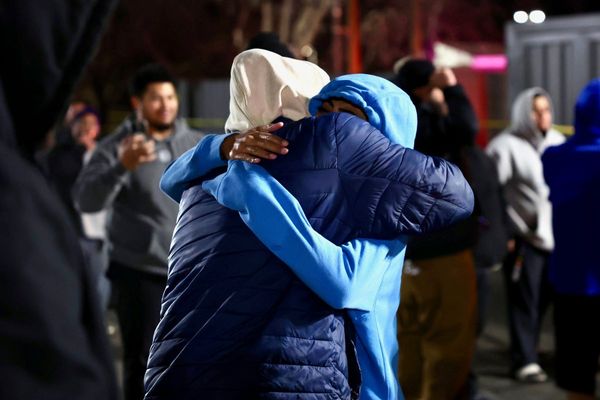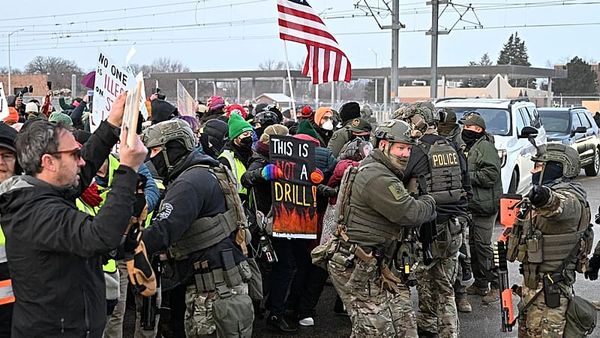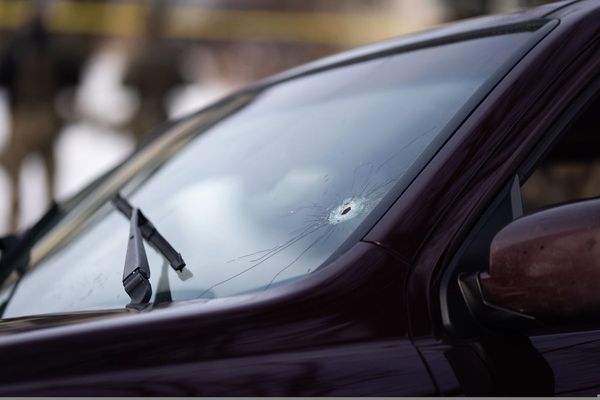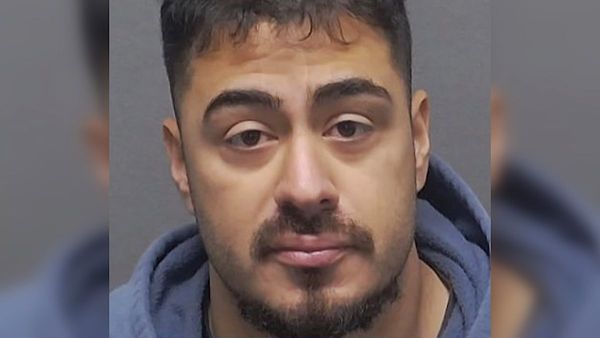CHICAGO — Former Chicago police Officer Jason Van Dyke was released from state prison Thursday after serving a little more than three years behind bars for the 2014 murder of Laquan McDonald, a shooting that roiled the city and has left a mixed legacy of reform.
The secrecy surrounding Van Dyke’s incarceration lasted up until his final hours behind bars, with state prison officials refusing to disclose where or exactly when he was being released.
A source told the Tribune that as of 10 a.m. Thursday, Van Dyke was “no longer in IDOC custody” but provided no further details.
Van Dyke still must serve three years of supervised release, which is Illinois’ version of parole.
Mayor Lori Lightfoot issued a statement early Thursday on Van Dyke’s impending exit from prison.
“I know some Chicagoans remain disheartened and angry about Jason Van Dyke’s sentence for the murder of Laquan McDonald. As I said at the time, while the jury reached the correct guilty verdict, the judge’s decision to sentence Van Dyke to only 81 months was and remains a supreme disappointment,” the statement read. “I understand why this continues to feel like a miscarriage of justice, especially when many Black and brown men get sentenced to so much more prison time for having committed far lesser crimes. It’s these distortions in the criminal justice system, historically, that have made it so hard to build trust.”
Lightfoot’s statement the Chicago Police Department and the city have made progress the reform effort since the killing. Experts, critics and other observers have been critical, though, of the pace of those changes.
“This prosecution led to historic reforms, including comprehensive legislation that created the first-ever community police oversight body in Chicago, and a consent decree to oversee CPD reform,” Lightfoot said. “There is much more work to do, and it is by doing that work that we can heal from this and move forward towards justice and accountability every day.”
Since his January 2019 sentencing, Van Dyke has served time at a downstate prison, a federal detention center in Connecticut, and at an undisclosed location as part of an interstate agreement where high-profile prisoners can be kept off databases of inmates available to the public online.
The Illinois Department of Corrections has for the past two years declined to say where Van Dyke was being held “for safety and security purposes.” But a two-page release order from the Prisoner Review Board, the government agency responsible for scheduling a prisoner’s supervised release program, stated Van Dyke had been at the Taylorville minimum-security prison near Springfield as of September 2021 when the order was signed.
While word of the ex-officer’s release caught many by surprise, Van Dyke was expected all along to leave custody in February 2022. Judge Vincent Gaughan sentenced him on the second-degree murder conviction — not his aggravated battery convictions — meaning Van Dyke was likely to serve only about half of his 81-month sentence.
Van Dyke must now complete his term of mandatory supervised release, Illinois’ version of parole. The only requirement marked on the review board’s form was that he participate in a cognitive behavioral therapy program, a common measure aimed at reducing recidivism.
Van Dyke’s release comes as Black leaders, as well as Illinois’ two Democratic senators, continue to pressure the U.S. Justice Department over a federal civil rights probe into the McDonald killing that ended quietly after Van Dyke was convicted in state court of second-degree murder and aggravated battery with a firearm. Van Dyke, who is white, was captured on police video shooting the Black teenager 16 times as he walked away from police with a knife.
On Tuesday, the president of the national chapter of the NAACP sent a letter to U.S. Attorney General Merrick Garland saying the lack of resolution in the federal case, coupled with Van Dyke’s pending release, was “clearly alarming” to the Black community.
“We trust that you find the matters alarming as well and join with us in our call for closure of that federal grand jury investigation,” wrote NAACP President Derrick Johnson. He also asked for Garland’s commitment in “moving forward with appropriate and applicable federal charges” based on the evidence.
Hours later, Sens. Dick Durbin and Tammy Duckworth penned a letter of their own noting that the state conviction does not preclude the filing of federal charges, citing the recent cases against Minneapolis police Officer Derek Chauvin, who was charged in both jurisdictions with the May 2020 murder of George Floyd.
“We urge the Justice Department to carefully and expeditiously complete its investigation,” the senators’ letter concluded.
A Justice Department spokesperson said the department has received the letters and “will review the information,” but declined further comment.
A spokesman for U.S. Attorney John Lausch declined to comment.
When asked Tuesday whether she would support bringing federal charges against Van Dyke, State’s Attorney Kim Foxx said she was not in a position to give federal prosecutors direction. But Van Dyke’s sentence was not appropriate given the seriousness of the crime he committed, she said. If he had been sentenced on his aggravated battery convictions, he would have faced a far longer term, and he would have had to serve more than half of it.
“I would suggest and hope and pray ... that any and all those who have the power to make sure that there’s accountability for the death of Laquan McDonald do everything that’s in their power to hold him accountable,” said Foxx, whose office did not handle Van Dyke’s prosecution.
“The sentence put down for Jason Van Dyke does not meet the crime, and if there’s an ability to do something about it on the federal level then by all means something should be done.”
Though there is no statute of limitations to bring a civil rights case involving a fatality, the Tribune reported earlier this week it would be exceedingly rare for the U.S. attorney’s office to charge Van Dyke now, more than three years after his conviction in state court.
Records show that just days after Van Dyke was sentenced in Cook County Criminal Court in January 2019, federal prosecutors told a federal judge in a search warrant application that the federal grand jury probe was winding down.
Last week, several prominent Black leaders cited the case against Chauvin, who was charged in state court and federally with Floyd’s death, in renewing calls for the U.S. Department of Justice to go after Van Dyke.
Blagg, one of Van Dyke’s attorneys, told the Tribune last week “justice isn’t served in the court of public opinion, justice is handed out in a courtroom.”
“Jurors heard Jason’s case. A judge gave Jason his sentence. And even if you don’t agree with it, you have to appreciate the long-term consequences of what you’re arguing for,” she said. “Arguing that someone should be charged by the feds because you don’t agree with the judge’s sentencing decision could have far-reaching consequences in our society.”
McDonald’s grandmother and aunt have joined activists in the call for Van Dyke to be charged federally, but his great-uncle, the Rev. Marvin Hunter, told the Tribune most of the family does not support further charges.
Charging Van Dyke twice for the same set of actions could set a bad precedent, Hunter said.
“I am not an advocate for Jason Van Dyke, he has not asked for forgiveness … but am I going to live my life harboring hate?” Hunter said. “The answer is no. I don’t. And my family don’t.”
If politicians and activists wanted to help, they should have supported Raoul’s push at the state Supreme Court to reexamine the sentence Gaughan handed down — instead of pushing for Van Dyke to be imprisoned again for something separate, Hunter said.
“If a man serves his time, he needs to be freed,” Hunter said. “If we’re going to be a civilized society we must follow the doggone laws and have them work for everybody the right way.”
———







